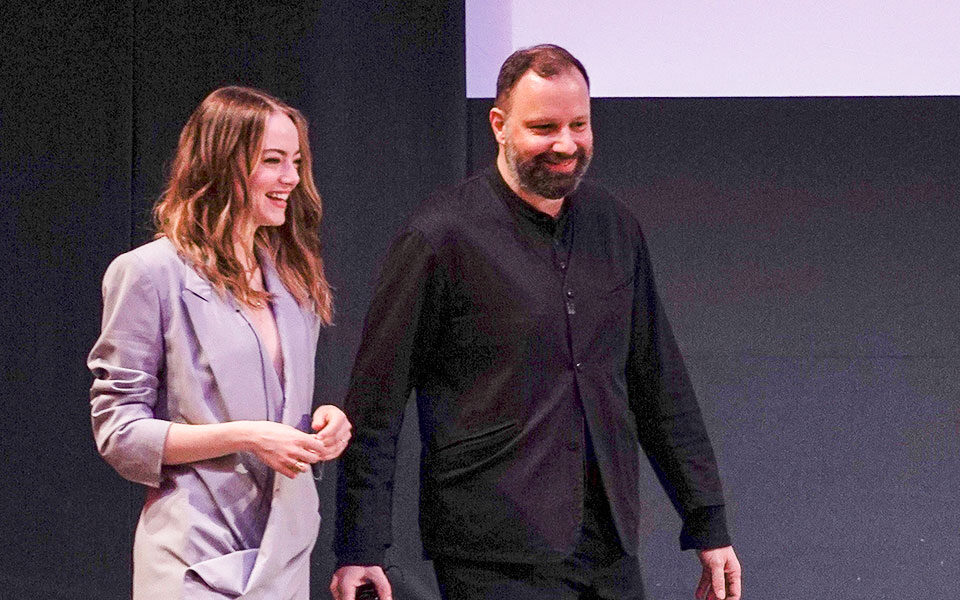For the last ten years or so, Yorgos Lanthimos lives abroad. The pandemic brought him back to Greece for longer periods of time, to rediscover his native Athens, and his beloved Olympiacos. Last week, photos of him at the Olympiacos-Monaco basketball game in company of Emma Stone made the rounds on the internet. “It was exciting! I’ve wanted to go for a long time, and was glad I got the chance,” he commented.
We met to interview him for just a few minutes following the press conference for his new film, at the Greek National Opera. He appeared happy, if somewhat overworked. “We have so little time…” I complained, feeling as if sand was rushing through an invisible hourglass. “Well the film is just 28 minutes long, what did you expect?” he joked.
Stressed, I quickly move on to the questions.
Watching “Bleat,” my first thought is that you’ve reconnected with the Greece portrayed in “Kinetta.” A Greece of a different era, through a different approach.
Now that you mention it… maybe. There are some things that touch me and interest me more than other things. I grow older, I evolve, and I see things differently.
Is returning to Greece also part of your “evolution”? You spoke about it once or twice at the press conference – about the language, which is familiar, and about “constraints that help creativity.” Now if constraints help creativity, why did you leave Greece? You had the perfect restricted space!
The limitations I had here helped me to form an approach, to succeed in discovering who I am, how I think, what I want to do. That was helpful to a degree. From that point on though, because cinema is a complicated and expensive artform, it was impossible for me to continue here. That’s why I left. On the other hand, as I left, the means for creating movies may have multiplied, but I also saw the downsides. As things grow, there are more rules, more people, it’s harder to control what you want to do… So, I continue to try to find a balance between those harsh restrictions, but also complete freedom, which I had when I started out, and this new, more complicated environment. To incorporate the spontaneity and freedom I had when I was making movies with friends in Greece.
This push to cross the threshold and leave your home, Greece, to make it internationally, was it internal? In other words, was the great success of “Dogtooth,” and the doors that it opened, what you were wishing for?
The success of “Dogtooth” made everything easier. I also think that, as the years have passed, it’s become easier for new creatives to have a career outside of Greece. Back then (in 2009), I was given the opportunity to make some connections. But there were no proposals. What helped more was that some actors appreciated my work, which gave me the opportunity to produce a film in another language. That’s how it began.
When you began creating artistically, there was freedom, as you said. Do you feel restricted by your reputation now, and the expectations that come with it? Do you feel more stressed about your work?
Yes, I do feel more stressed. I don’t know if it’s because of the expectations, because I now have the experience and know what it means to make a movie, share it with the world, and watch its impact and the reactions. I was more naïve in the beginning, I think, and didn’t pay attention to how things would go, what people were expecting of me, if I should be doing something different or the same, if I did something well and should repeat it. I would just find something that interested me, and focus on that and getting it done in the best way.
You said “naïve.” Are you more skeptical now, in a way?
Yes, you can’t avoid it. Experience makes you cynical.
From “The Favorite” to “Bleat,” there’s a big gap.
Yes and no. Making “The Favorite” steered me towards “Bleat;” “Bleat” wouldn’t be what it is without “The Favorite.” From the aesthetics to forming a relationship with Emma (Stone). Everything you do leads to the next thing, no matter how different it may seem.
In an interview we did in 2011 about “Kinetta,” you said that “Greek cinema is imported to Greece.” That international accolades are needed in order for a film to make it in Greece. Is that still true?
To a certain degree yes… There’s more production and extroversion now, so the balance has changed a bit. But a film always has to be approved abroad before getting be acknowledged in Greece. And a lot of creators feel this way, so I guess it is true.
Do you feel a bit like an ambassador of Greek cinema abroad?
I don’t think about that at all…
This article was previously published in Greek at kathimerini.gr.












